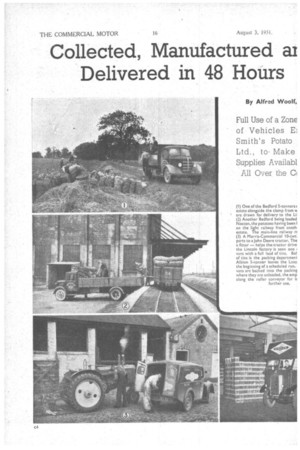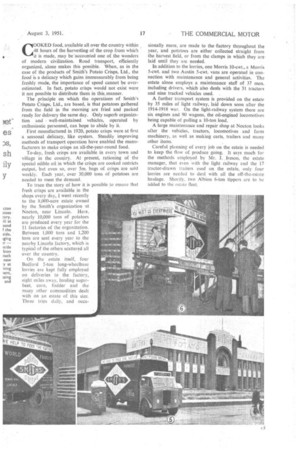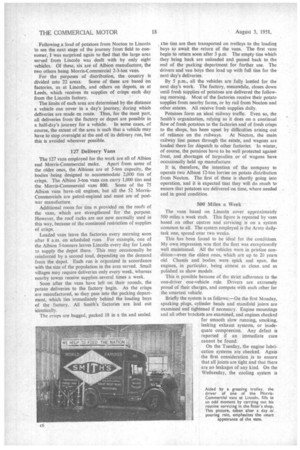Collected, Manufactured al Delivered in 48 Hours
Page 42

Page 43

Page 44

Page 45

If you've noticed an error in this article please click here to report it so we can fix it.
By Alfred Woolf,
Full Use of a Zone of Vehicles El Smith's Potato Ltd., to Make Supplies Availabl All Over the C(
COOKED food, available all over the country Within 48 hours of the harvestingof the crop from which it is made, may be 'accounted one of the 'wonders of modern civilization. Road transport, efficiently organized, alone makes this possible. When, as in the case of the products of Smith's Potato Crisps, Ltd., the food is a delicacy which gains immeasurably from being freshly made, the importance of speed cannot be overestimated. In fact, potato crisps would not exist were it not possible to distribute them in this...manner.
The principle on which the operations of Smith's Potato Crisps, Ltd., are based, is that potatoes gathered from the field in the morning are fried and packed ready for delivery the same day. Only superb organization and • well-maintained vehicles, operated by enthusiastic personnel, can hope to abide by it.
First manufactured in 1920, potato crisps were at first a seasonal delicacy, like oysters. Steadily improving methods of transport operation have enabled the manufacturers to make crisps an all-the-year-round food.
To-day, fresh crisps are available in every town and village in the country. At present, rationing of the special edible oil in which the crisps are cooked restricts output, but even so, over 5m. bags of crisps are sold weekly. Each year, over 30,000 tons of potatoes are needed to meet the demand.
To trace the story of how it is possible. to ensure that fresh crisps are available in the shops every day, 1 went recently to the 8,000-acre estate owned by the Smith's organization at Nocton, near Lincoln. Here, nearly 10,000 tons of potatoes are produced every year for the 11 factories of the organization. Between 1,000 tons and 1,200 tons are sent every year to the nearby Lincoln factory, which is typical of the others scattered all over the country.
On the estate itself, four Bedford 5-ton long-wheelbase lorries are kept fully employed on deliveries to the factory, eight miles away, hauling sugarbeet, corn, fodder and the many other commodities dealt with on an estate of this size. Three trips daily, and occa sionally more, are made to tho-factory• throughout the year, and potatoes are either collected straight from the harvest field, or from the clamps in which they are laid until they are needed.
In addition to the lorries, one Morris 10-ewt., a Morris 5-cwt. and two Austin 5-cwt. vans are operated in con, nection with maintenance and general activities. The estate alone employs a maintenance staff of 37 men. including drivers, which also deals with the 31 tractors and nine tracked vehicles used. .
A further transport system is provided on the estate by 35 miles of light railway, laid down soon after the 1914-1918 war. On the light-railway system there are six engines and 90 wagons, the oil-engined locomotives being capable of pulling a 10-ton load.
A large maintenance and repair. shop at Nocton looks after the vehicles, tractors, locomotives and farm machinery, as well as making carts, trailers and many other items.
Careful planning of every job on the estate is needed to keep the flow of produce going. It says muchfor the methods employed by Mr. J. Ireson, the estate manager, that even with the light railway and the 17 tractor-drawn trailers used on the estate, only four lorries are needed to deal with• all the off-the-estate haulage. Shortly, two Albion 6-ton tippers are to be added to the estate fleet.
Following a load of potatoes from Nocton to Lincoln to see the next stage of the journey from field to consumer, I was surprised again to find that the large area served from Lincoln was dealt with by only eight vehicles. Of these, six are of Albion manufacture, the two others being Morris-Commercial 2-3-ton vans.
For the purposes of distribution, the country is divided into 22 areas. Some of these are based on factories, as at Lincoln, and others on depots, as at Leeds, which receives its supplies of crisps each day from the Lincoln factory.
The limits of each area are determined by the distance a vehicle can cover in a day's journey, during which deliveries are made en route. Thus, for the most part, all deliveries from the factory or depot are possible in a half-day's journey for a vehicle. In some cases, of course, the extent of the area is such that a vehicle may have to stop overnight at the end of its delivery run, but this is avoided wherever possible.
127 Delivery Vans
The 127 vans employed for the work are all of Albion and Morris-Commercial make. Apart from some of the older ones, the Albions are of 5-ton capacity, the bodies being designed to accommodate 2,000 tins of crisps. The Albion 3-ton vans can carry 1,000 tins and the Morris-Commercial vans 800. Some of the 75 Albion vans haveoil engines, but all the 52 MorrisCommercials are petrol-engined and most are of postwar manufacture.
Additional room for tins is provided on the roofs of the vans, • which are strengthened for the purpose. However, the roof racks are not now normally used in this way, because of the continued restriction of supplies of crisps.
Loaded vans leave the factories every morning soon after 8 a.m. on scheduled runs. For example, one of the Albion 5-tonners leaves Lincoln every day for Leeds to supply the depot there. This may occasionally be reinforced by a second load, depending on the demand from the depot. Each run is organized in accordance with the size of the population in the area served. Small villages may require deliveries only every week, whereas nearby towns receive supplies-several times a week.
Soon after the vans have left on their rounds, the potato deliveries to the factory begin. As the crisps are manufactured, so they pass into the packing department, which lies immediately behind the loading bays of the factory. All Smith's factories are laid out The crisps are bagged, packed 18 in a tin and sealed. , the tins are then transported on trolleys to the loading bays to await the return of the vans. The first vans begin to return soon after 3 p.m. The empty tins which they bring back arc unloaded and passed back to the end of the packing department for further use. •The drivers and van boys then load up with full tins for the next day's deliveries.
By 5 p.m., all the vehicles are fully loaded for the next day's work. The factory, meanwhile, closes down until fresh supplies of potatoes are delivered the following morning. Most of the factories receive their potato supplies from nearby farms, or by rail from Nocton and other estates. All receive fresh supplies daily.
Potatoes form an ideal railway traffic. Even so, the Smith's organization, relying as it does on a continual flow of fresh potatoes to the factories and of fresh crisps, to the shops, has been upset by difficulties arising out
of reliance on the railways. At Nocton, the main railway line passes through the estate, and wagons are loaded there for dispatch to other factories. In winter, of course, the potatoes have to be well protected against frost, and _shortages of tarpaulins or of wagons have occasionally held up manufacture.
It is, therefore, the intention of the company to operate two Albion 12-ton lorries on potato distribution from Nocton. The first of these is shortly going into operation, and it is expected that they will do_ much to ensure that potatoes are delivered on time, where needed and in good condition.
500' Miles a Week The vans based on Lincoln cover approximately 500 miles a week each. This figure is repeated by vans based on other centres and servicing is on a system common to all. The system employed is the Army dailytask one, spread over two weeks..
This has been found to be ideal for the conditions. My own impression was that the fleet was exceptionally well maintained. All the vehicles were in pristine condition—even the oldest ones, which are up to 20 years old. Chassis and bodies were spick and span, the engines, in particular, being almost as clean, and as polished as show models This is possible because of the strict adherence to the one-driver one-vehicle rule Drivers are extremely proud of their charges, and compete with each other for the smartest vehicle.
Briefly the system is as follows:—On the first Monday, sparking plugs, cylinder heads and manifold joints are examined and tightened if necessary. Engine mountings and all other brackets are examined, and engines checked for smooth slow running, smoking, leaking exhaust systems, or inadequate compression. Any defect is reported if an immediate cure cannot be found, On the Tuesday, the engine lubri; cation systems are checked. Again the first consideration is to ensure that all joints are tight and that there are no leakages of any kind. On the Wednesday, the cooling system is tested, joints and clips tightened, fan belts and spindle bearings lubricated, radiator flushed out and clogged air spaces cleared.
Two tasks are undertaken on the Thursday. These are the inspection of the fuel-supply system, from tank to carburetter. Any loose union is tightened. Friday, too, is a day when two tasks are required. These are the cleaning and securing of high-tension leads and the cleaning, inspection and tightening of ignition components, such as coils, distributors, etc. Wireless suppressors are fitted to all vehicles powered by petrol engines.
Clutch, gearbox, transmission and front and rear axles are dealt with on the Saturday. The work follows the pattern of earlier .operations—inspection, cleaning, adjustment and lubrication. Back axles are topped-up, road wheels examined and their bearings checked for signs of slackness.
Second Week's Programme In the second week of the servicing cycle, the sequence is as follows: Monday, steering inspection; Tuesday, examination of battery, topping-up cells, cleaning and protecting terminals, and testing charging arrangements; Wednesday, electrical equipment—starter motor, head lights, windscreen wipers, etc. The windscreen-wiper motors are suppressed, as are the plugs and coils. Thursday, chassis inspection, which includes lubrication of door hinges, locks, and so on. Friday, tyres, tools and the fire-extinguisher, which every van carries, are checked.
The final item on the servicing schedule is left to the second Saturday of the fortnight. First, chassis and springs are greased and sprayed, shock absorbers topped-up and then the brakes are given a thorough check, adjustment, if needed, being carried out by the driver, under supervision, wherever possible. Oil changes are based on recommendations made by the vehicle manufacturer.
This exhaustive servicing procedure is readily undertaken by the drivers, who are given every assistance in the way of equipment. By keeping even the underside of the vehicles clean, the time taken for each operation is reduced to a minimum, and the work is checked by each depot or factory manager, who initials the driver's entry in the log book in which details of all servicing are entered.
A Travelling Inspector Further inspection of the condition of the vans is carried out by a travelling inspector, Major Rix, who estimates that every one is examined at least five times a year. Having seen one of the inspector's reports, I can testify to its thoroughness. Details such as faulty door catches and defective wiring, as well as major items, come under his surveillance. If a van shows signs of needing a major overhaul, he arranges for a replacement vehicle to be sent out from the head office at Brentford, Middlesex, where the old one is sent for overhaul.
Minor repairs which require a fitter's attention are recorded in the log book. All charges incurred in the running of the vans are dealt with from head office, which thus has a complete record of the cost of operating every unit in the fleet. Heavy oil consumption may, for example, be first detected at head office and attention given to the vehicle in question.
With a low-cost commodity such as potato crisps, the cost of distribution is a major item and, therefore, no vehicle is allowed to become a constant drain on the company's finances. The keenness of the drivers and•
the fact that the vans are never, in any circumstances, loaded beyond capacity, help to keep running costs at a low level.
Naturally, drivers are encouraged in every way. Many receive a bonus for accident-free driving. A large proportion have been with Smith's for over 20 years, many since they left school, when they were taken on as van-boys. There are two categories of driver. Some are country drivers, who simply deliver from factory or depot, the orders having been obtained by representatives.
Salesman and Driver
• Others are driver-salesmen, entrusted with the duty of obtaining orders as well as of delivering them. Customers have been known to set their clocks by the arrilral times of these drivers. In some cases customers ' leave it entirely to the driver to tell them what quantity of crisps they need in view of prevailing conditions— such as the approach of holiday periods or the holding of a purely local function.
The part played by the drivers in the operation of the Smith's organization is, therefore, outstanding. It does not pass unnoticed by the directors. This was revealed by the chairman's speech at the annual general meeting of the company in July. "Transport must play an important part in our business when the problem of distribution and collection of tins and the bulk of our product in relation to its price is realized," he said. The smart appearance of the vans and the courtesy of the drivers was familiar from Land's End to Inverness. "We are proud of it," he concluded, "and its untiring efficiency is a big factor in 'our continued success."
Mr. -Cyril J. Scott, the director who supervises the operation of. the transport system, and who introduced the daily-task maintenance scheme, added another
compliment. Part of the reason why we have been able to' keep down the price of our product is the economic operation of the fleet," he said. Politicians' statements to the effect that the cost of road transport has no bearing on the cost of living cannot bear scrutiny in the 'light Of this transport operator's. experience. It is obvious that the lower the initial value of the goods, the greater Must be the -influence of transport costs. on the selling price of the product.




















































































